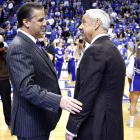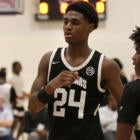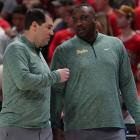
Kentucky and North Carolina represent the pinnacle of college basketball and the rivalry between the Wildcats and the Tar Heels is so well-worn, there is an extensive Wikipedia page dedicated to its history.
It is undeniably beneficial to college basketball to have these two juggernauts clash on annual basis. UNC and UK played each other every season for the first 15 years of this century and have gone head-to-head a total of 37 times dating back to the 1920s.
They'll meet up again on Dec. 17 at the CBS Sports Classic in Las Vegas. It's a neutral-site game, which isn't as good as an on-campus one, but at least the series is continuing.
But not for long, unfortunately. When it comes to optimal non-conference scheduling, college basketball can't help but punch itself in the neck all the time.
Why does this have to be? Blame the ACC and the powers-that-be building up the ESPN-owned ACC Network. In an effort to maximize content, television advertising revenue and inventory, the ACC has made the business decision to go to 20 conference games beginning in 2019-2020, when the ACC Network is slated to roll out. Going to 20 intraleague tilts means two more than the current construction, meaning it's two less non-conference games UNC has to worry about.
Roy Williams went on an ESPN podcast earlier this week and said because of this, the UK-UNC series is almost certainly going to end come 2019-2020.
"My feeling right now, and it could change by '19, heck I could be fired by '19," Williams said, "but my feeling right now is to play our conference schedule, play one exempt event where you have really good teams, and other than that play home games to help out your revenue and help out your budget. My business manager, she drives me crazy because we play 15 or 16 home games, and she sees some other teams playing 20 or 21 or 22. That's what she wants. She wants more revenue coming in. So right now that's my thinking. ... We have the ACC/Big Ten (Challenge) and that is not going to go away. So it's 21 already scheduled and play one exempt event."
Williams is right that he might not be coaching at UNC come 2019-2020. It would not surprise me at all if that happened to be the case. But playing 20 conference games is not his decision anyway. He said the league made the decision without even consulting the coaches in the league.
And when asked specifically if this 20-game authorization would put an end to UNC's series with Kentucky, Williams said, "Oh yeah. ... Why would I need to do that?"
There's no "need," so to speak, but let's break this down really quickly. North Carolina already plays games annually against Duke and NC State. Because of its stature, it will also be guaranteed at least a home game -- and a road game -- against two of the league's best on a yearly basis, whether those teams are Louisville, Syracuse, Virginia, Notre Dame, you name it.
So UNC will get another home game and another road game. Those games could come against average-or-below teams in a given season. If a home-and-home was to be scheduled between UK and UNC going forward, both programs -- and college basketball on the whole -- would still benefit. Is it necessary for Carolina's profile to continue the series? No, it's not.
But having a 20-game schedule shouldn't automatically take games like that off the table. If it's about revenue, UNC will still get it if it wants to hold a home-and-home in perpetuity with UK. That shouldn't be hard to pull off, and in most years that game would be a top-10 non-conference game in the sport, easily.
Williams has made a habit of scheduling relatively difficult slates, being unafraid to go on the road. It's one of his best traits as a coach. He's never run from that stuff. The ACC going to 20 games gives all those coaches an easy out on scheduling tougher opponents. Carolina's on a different level, though. It can still schedule four or five lesser opponents and home and still make room for UK.
UNC, by the by, leads the series 23-14. Why give up when you're ahead?





















